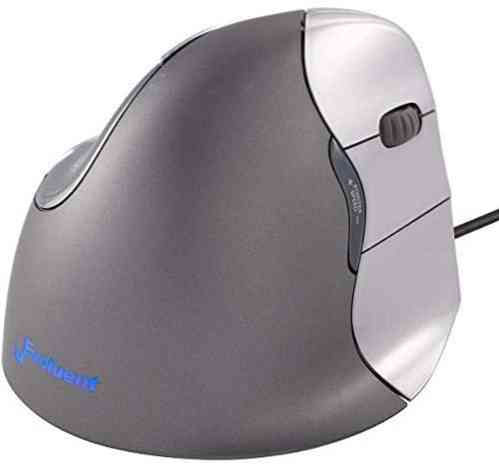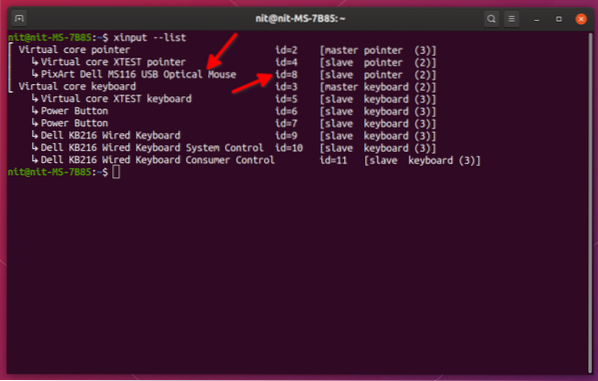Reviews of Laptops for Computer Science Students
Dell XPS 13 9360 8th Gen Quad-Core i5
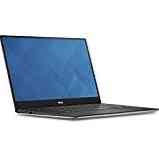
If you are a big fan of Windows operating systems but also want to dual boot into Linux, the Dell XPS 13 9630 is certainly an option you should be considering. This laptop is incredibly lightweight which is perfect for those times when you need to carry your laptop around the place to different buildings in your school.
Not only that, but the laptop is super simple to use. It has a highly intuitive trackpad that isn't even remotely awkward to use like some are, and the keyboard is smooth to use. It's pretty durable too! One of the best things about this laptop is that you can use it effectively with Linus Distros.
As far as specifications are concerned, this option is fairly impressive. The standard model features an Intel Core i5-8265U processor, and it has 8GB RAM. It even has a 256GB SSD. If you wish to, you can upgrade the laptop to a Core i7 processor with 4K resolution. It should be noted though that this is fairly expensive, even in the standard version, so you will definitely need a higher budget to get this laptop.
Pros
- Works well with Linux Distros
- Powerful
- Portable
Cons
- Expensive
 Dell XPS 13 9360 Laptop (13.3" InfinityEdge Touchscreen FHD (1920x1080), Intel 8th Gen Quad-Core i5-8250U, 128GB M.2 SSD, 8GB RAM, Backlit Keyboard, Windows 10)- Silver
Dell XPS 13 9360 Laptop (13.3" InfinityEdge Touchscreen FHD (1920x1080), Intel 8th Gen Quad-Core i5-8250U, 128GB M.2 SSD, 8GB RAM, Backlit Keyboard, Windows 10)- Silver - Intel 8th Generation Quad-Core i5-8250U 1.60 GHz (Turbo 3.40 GHz, 4 Cores 8 Threads, 6MB SmartCache)
- 13.3" InfinityEdge Touchscreen FHD (1920x1080) Display
- 128GB M.2 SSD | 8GB 1866MHz LPDDR3 RAM
- Backlit Keyboard | Wireless-AC + Bluetooth combo | HD Webcam | Thunderbolt 3 port
- Windows 10 Home 64-bit
ASUS ZenBook 13 Ultra-Slim | Intel Core I5 | 512GB PCIe SSD
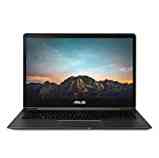
Above all else, you want a reliable laptop that will support you in your studies. We're pleased to report that you will most certainly get that with the ASUS ZenBook. This laptop has all of the power that you need in a laptop for your computer science studies.
The specifications on this laptop are pretty good. It features a Core i5-8265U 3.4GHz Processor and 8GB RAM. It's very lightweight, making it easy to carry from a to be, and it has a pretty large trackpad that is easy to use and navigate.
The laptop also has a FHD resolution screen so you can see everything with great clarity. With that being said, the laptop only has a short battery life so this is something you should keep in mind.
Pros
- Durable
- Large trackpad
- Great specs
Cons
- Only 8 hour battery life
 ASUS ZenBook 13 Ultra-Slim Laptop- 13.3” Full HD Wideview, 8th Gen Intel Core I5-8265U, 8GB LPDDR3, 512GB PCIe SSD, Backlit KB, Fingerprint, Windows 10- UX331FA-AS51 Slate Grey
ASUS ZenBook 13 Ultra-Slim Laptop- 13.3” Full HD Wideview, 8th Gen Intel Core I5-8265U, 8GB LPDDR3, 512GB PCIe SSD, Backlit KB, Fingerprint, Windows 10- UX331FA-AS51 Slate Grey - 13.3 inch wide-view full-HD NanoEdge bezel display
- Intel Core i5-8265u processor (6M Cache, upto 3.9 GHz)
- Fast storage and memory featuring 512GB PCIe M.2 SSD and 8GB LPDDR3 RAM
- Extensive connectivity with HDMI, USB type C, Wi-Fi 5 (802.11AC) and Micro SD card reader (USB transfer speed may vary. Learn more at Asus website)
- Sleek and lightweight 2.5 pounds aluminum body for comfortable portability
Apple MacBook Air (13-inch - 128GB SSD Storage - Silver
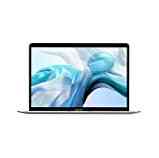
If you're a fan of seeing that big half bitten Apple logo every time you look at your devices, then the MacBook Air may just be the choice for you. The MacBook Air is actually one of the most popular laptops out there for computer science students, but why should you get one?
Well, to begin with, on the Macbook you can use the three main operating systems: Windows, OSX and Linux. In addition to this, there are a bunch of different programming languages that are already installed onto the device. The specifications are pretty impressive too. The laptop is fairly lightweight, so you can easily fit it in your school bag and barely notice it's there while you are walking.
The laptop additionally has around 13 hours worth of charge and a high resolution screen. The biggest problem, as is the case with many Apple products, is that it's incredibly expensive so you will need a significantly higher budget to purchase this laptop.
Pros
- Can use various operating systems on the laptop
- 13 hours of charge
- Lightweight
Cons
- Expensive
 Apple 13" MacBook Air Core i5 CPU, 8GB RAM (2017 Model 128GB)
Apple 13" MacBook Air Core i5 CPU, 8GB RAM (2017 Model 128GB) - 1.8 GHz dual-core Intel Core i5 Processor
- Intel HD Graphics 6000
- Fast SSD Storage
- 8GB memory
- Two USB 3 ports
Acer Aspire 5 | AMD Ryzen 3 | 128GB SSD+500GB HDD| Backlit KB
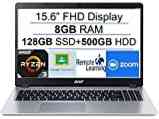
On the opposite end of the spectrum to the Macbook, the Acer Aspire 5 is an affordable option for computer science students. This laptop is fairly powerful considering its budget price, not to mention it's pretty lightweight.
The laptop has 8GB RAM, which is more than enough for a computer science student. The laptop is fairly thin, so you can slip it into your bag without an issue. You can use Linux and Windows on the laptop.
As far as specifications are concerned, the laptop is decent: Core i3 processor, 8GB DDR4 RAM, and 8 hours of battery life. It is by no means the most impressive laptop out there, but it is more than sufficient for a computer science student.
Pros
- Very affordable
- Decent specs
- Lightweight and portable
Cons
- It could do with a better processor
 2020 Newest Acer Aspire 5 15.6" FHD 1080P Laptop Computer| AMD Ryzen 3 3200U up to 3.5 GHz(Beat i5-7200u)| 8GB RAM| 128GB SSD+500GB HDD| Backlit KB| WiFi| Bluetooth| HDMI| Windows 10| Laser USB Cable
2020 Newest Acer Aspire 5 15.6" FHD 1080P Laptop Computer| AMD Ryzen 3 3200U up to 3.5 GHz(Beat i5-7200u)| 8GB RAM| 128GB SSD+500GB HDD| Backlit KB| WiFi| Bluetooth| HDMI| Windows 10| Laser USB Cable - 15.6 inches Full HD (1920 x 1080) Widescreen LED backlit IPS Display; AMD Radeon Vega 3 Mobile Graphics
- AMD Ryzen 3 3200U (2.60 GHz, up to 3.50 GHz with Turbo Boost, 4 MB Cache, 2 Cores ), 3-cell lithium-ion, up to 6 hours battery life mixed-use
- RAM is upgraded to 8GB DDR4 memory for multitasking Adequate high-bandwidth RAM to smoothly run multiple applications and browser tabs all at once
- Hard Drive is upgraded to 128GB SSD + 500GB HDD provides massive storage space for huge files, so that you can store important digital data and work your way through it with ease. Enhance the overall performance of the laptop for business, student, daily usage
- 1 USB 3.1 Gen 1 Port, 2 USB 2.0 Ports & 1 HDMI Port with HDCP support,802.11ac Wi-Fi; Backlit Keyboard; Up to 7.5 Hours Battery Life,Windows 10 in S mode. Maximum Power Supply Wattage 65 W + Laser USB External Cable
Microsoft Surface Pro 7 - Touch-Screen - Intel Core i5 | 128GB SSD

If you are a student studying for your computer science major, the Surface Pro 7 is a great choice. In fact, you can use the OneNote that comes with the Surface Pro to read your books, and you can even take notes using it like you would with a notebook. All of your key school information in one organized place!
The laptop is pretty affordable, ideal for a student on a budget. It also boasts pretty impressive performance, with 8GB RAM. As far as the processor is concerned, you can choose a Core M3 processor or Core i5 Processor. We recommend getting the i5 processor for computer science.
The laptop features a relatively small 12.5 inch display, but with high resolution so you can see all of your work with the utmost clarity. It should be noted that it can take a little bit of time to get used to the keyboard on the laptop, but it is otherwise a stellar option for any student.
Pros
- High performance
- Portable - ideal for carrying to classes
- Touch screen compatibility - great for note taking!
Cons
- Not the best choice for programming
 Microsoft Surface Pro 7 - 12.3" Touch-Screen - 10th Gen Intel Core i5 - 8GB Memory - 128GB SSD (Latest Model) - Platinum with Black Type Cover
Microsoft Surface Pro 7 - 12.3" Touch-Screen - 10th Gen Intel Core i5 - 8GB Memory - 128GB SSD (Latest Model) - Platinum with Black Type Cover - Next-gen, best-in-class laptop with the versatility of a studio and tablet, so you can type, touch, draw, write, work, and play more naturally
- Faster than surface pro 6, with a 10th gen intel core processor - redefining what's possible in a thin and light computer.
- More ways to connect, with both USB-c and USB-a ports for connecting to displays, docking stations and more, as well as accessory charging. Bluetooth: Bluetooth 5.0
- Standout design that won't weigh you down - ultra-slim and light surface pro 7 starts at just 1.70 pounds
- All day battery life up to 10.5 hours, Plus the ability to go from empty to full faster - about 80 percent in just over an hour
Best Laptop for Computer Science Students: A Buyer's Guide
When you're a computer science student, you can't just go for any old laptop. You need to make sure that the specifications will match your requirements - you need something that's fast and provides an impeccable performance.
You want something with a decent processor, and something that's ideally affordable for your budget! So what are the main things you should be looking for? Here's the low down.
Display
If you are a student then you may find that a matte display is a better option for you. You will be less likely to strain your eyes with this option. With that being said, you should still try to make sure that you get full HD resolution. This will help to stop your eyes from getting super tired, and it will make the screen much easier to read for you.
You should always prioritize getting a good display if you are getting a laptop for computer science. You may even wish to prioritize it slightly more than the CPU or the battery, though this depends on the exact tasks that you are going to be using the laptop to do.
Size
Getting a larger screen is certainly beneficial, but it isn't a must have. Larger screens can even make a laptop less portable, which can be a bit cumbersome as you are walking to your classes.
Smaller laptops are ideal because they are more portable, but anything too small may end up hurting your eyes. 13 inches is usually the best for portability, and you should try to avoid 17 inches unless carrying a hefty laptop is not an issue for you.
CPU
It is vital that you choose a laptop with a fantastic CPU performance if you are studying computer science. Try to get a laptop with an Intel Core i7 or an Intel Core i5 processor. Some AMD Ryzen processors are also a good choice.
Your laptop needs to deal with especially demanding projects, so making sure that you have a powerful, fast processor is ideal. A processor made back in the early 2000's certainly isn't going to cut it, so you can't borrow your grandma's old PC for your studies!
Operating System
There are three main choices: Linux, Windows, and MacOS Apple. As this is LinuxHint.com we will encourage you to go for Linux. That being said, if you are a student and your budget is tight as well as your schedule, the convenience of Windows or MacOS might be preferred as they are more “ready to go”.
Windows can be easily dual booted to Linux so you can get both experiences, and many companies hire programmers and developers and give them Apple computers, so that might prepare you well.
Storage
As a student, you are going to be saving a lot of things onto your computer. For this reason among others, you need to take some time to think about the storage space that your laptop has. You should really try to get an SSD instead of a HDD hard drive. You will likely have faster performance if your laptop has SSD.
SSD's are usually much more durable and reliable in comparison to HDDs. If you are in the market for the best laptop for computer science students, then you need to make sure that you have plenty of storage, ideally and SSD. You can even opt for a dual storage system that incorporates an SSD and HDD.
Graphics Card
Graphics are a good thing to consider if you want the best possible performance in your computer science laptop. It may not be essential to have the best possible graphics card if you are only using the laptop to do your assignments, but if you participate in extracurricular activities such as gaming, a powerful graphics card is essential.
If you are looking for a good graphics card, then you should think about getting a dedicated graphics card.
Battery
If you're a student, the chances are that you are going to be carrying your laptop from your home on campus to your lectures to take notes. Sure, some classrooms have power outlets where you can plug your laptop into, but not all of them do so it's best not to rely on them.
At an absolute minimum, you should be getting a laptop with six hours of battery life when not attached to a mains outlet. Usually lightweight laptops will have more battery life than high end gaming laptops do, so you should keep this in mind.
RAM
At a minimum, you should be looking for 8GB of RAM. You are going to be running a lot of code and a lot of different applications at once, so it's important that your laptop is capable of multitasking. If you are able to, you should certainly try to get more RAM than this, but 8GB should be more than sufficient in most cases.
Keyboard
You should try to make sure that your laptop has a decent keyboard and mousepad. Afterall, you're going to be using it on a regular basis, so a keyboard that's a pain to use if going to be more trouble than it's worth. Check for a keyboard that has ample spacing in between the keys. Backlit keyboards can also be helpful for those late night study sessions if you need them.
Connectivity
If you are using a laptop, you are probably going to need to access WiFi. You may also need extra HDMI ports. So, first of all, make sure that you have a HDMI port on your laptop, as this will allow you to connect the laptop to another screen, which can make things much easier to see.
It's also worth checking if your laptop has USB slots you can use, just in case you need to carry a memory stick from one computer to your laptop.
Frequently Asked Questions
Is it worth getting a gaming laptop for my computer science studies?
A gaming laptop is certainly a good choice for a computer science student. Gaming laptops provide great performance, as gaming laptops have high specifications so they can handle pretty much anything. Of course, the decision is ultimately up to you.
Is it worth getting a bulky laptop for my computer science studies if it has the performance that I'm looking for?
Generally, laptops that have high specifications and a lot of features can be a little bit too heavy to carry around everywhere. That's just an unfortunate trade off, especially if you want a more affordable laptop. It's certainly worth getting a bulkier laptop for those better specifications - these laptops are usually going to last longer too because of the high specifications.
How long can I expect the Laptop to last for me?
If you get a high quality machine, it might last 7 years or longer if you take good care of it. A throw away cheaper model might last a year at most. With the evolution of the technology, expect to refresh your system every two years at this stage in your career.
 Phenquestions
Phenquestions

